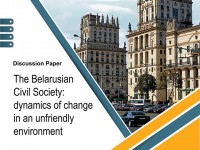We present a Discussion paper of dynamics of changes in the Belarusian civil society in 2015-2017.
Uladzimir Matskevich’s video reports “Political techniques of the third generation” — Part One

The first report of the Belarusan philosopher and methodologist is dedicated to the introduction of the concept of “political techniques of the third generation”.
Uladzimir Matskevich analyzes one of the most striking cases of their application in the situation of 2006 presidential elections in Belarus.
Political techniques of the third generation is a set of methods and techniques of working with mass consciousness and protest activity, used in the former Soviet countries, primarily in Belarus and in Russia. The purpose of these techniques is to ensure controllability of socio-political processes, while maintaining appearance of democracy and free will of citizens.
Application of political techniques of the third generation is fundamentally different from the way totalitarian power in the Soviet Union organized the electoral process. Then, the regime controlled all aspects of the political process; elections were uncontested and therefore the result of elections was guaranteed up to a tenth of a percent. In modern Belarus and Russia, political opposition is present in the elections, as well as independent media, being weak, though, and there are alternative candidates. None the less, the process is organized with absolute guarantee of the result planned by the current power.
Belarusan philosopher and methodologist Uladzimir Matskevich begins his series of reports on modern authoritative techniques with the analysis of one of the most striking cases, which refers to the recent political history of Belarus. This is the 2006 elections, after which the Belarusan authorities gained almost complete control over the situation in the country. The role of Alexander Kozulin is examined in the report. This politician had been a bright star on the political horizon of Belarus, and his political career was completely finished after three years. Active member of the Lukashenka team for many years, Kozulin had dramatically gone into opposition to make a quick career there, just a year before the 2006 presidential elections. Being the most expressive and radical opposition leader, he did not take part in reaching agreement on the unification of all democratic forces before the elections, he sabotaged electing a “united candidate” from the opposition.
It is interesting to watch the fate of these two candidates after the end of the elections and the dispersal of the protests that followed. Aleksander Kozulin received a prison term for taking part in unauthorized protests, he spent more than two years in prison, was then recognized as a political prisoner. His authority remained at a high level all the time within a protest part of the electorate. However, after the pardon and the release from prison Alexander Kozulin quietly left the political scene, without using or transfering the gained political capital to anyone. Alexander Milinkevich also had fairly broad support in the circles of the Belarusan opposition; however, almost immediately after the elections, a paid PR campaign against him was launched, known under the name of “Bleach M”. It caused a great damage to his image. As a result, after the 2006 elections that potentially carried a great opportunity to consolidate the protest electorate, the Belarusan opposition remained without a leader, and the idea of a “united candidate” was compromised, as well as the idea of post-election protest.
Objectively, Kozulin’s role in the 2006 elections was that he pulled over a part of the protest electorate, and did not allow to consolidate all the forces around Alexander Milinkevich. He has done his job, shattered and weakened the opposition and caused fatal disappointment in the possibility of the Belarusan “Maidan”. Was Kozulin a puppet of the Belarusan regime, or did he deliberately play his part? The question in this case is not a matter of principle. What is important is that this example clearly shows how the third generation political techniques work. The methods and effects of these techniques will be considered in future reports of the series “Political techniques of the third generation, the war on consciousness, and the European security system”.
[Please don't forget to turn the captions on for English subtitles!]
You can watch the full video report in Russian here.
See also: Uladzimir Matskevich: Political techniques of the third generation
Others
-
Belarusan human rights defenders’ view on human rights activity and questions of cooperation between Belarusan human rights organizations
We present a research results report of Belarusan human rights organizations sector.
-
Social base of transformation programs in Belarus
We present a sociological research report (abridged version) of social base of transformation programs in Belarus.
-
Potential and opportunities for launching in Belarus the mechanisms to enjoyment of all human rights by persons with disabilities
We present a research results report (abridged version) of potential and opportunities for launching in Belarusan regions the mechanisms of local planning to promote, protect and ensure the full and equal enjoyment of all human rights and fundamental freedoms by all persons with disabilities.
-
Civil society’s role and place in the system of donor assistance to Belarus (2006-2014)
The Centre for European Transformation has prepared a working paper on civil society’s role and place in the system of external assistance to Belarus in 2006-2014.








Comments
From farewell to a new Eastern policy and towards a new development
Poland and Germany were both initiators and drivers of a New Eastern policy linked to the Eastern neighborhood and Russia/Soviet Union.